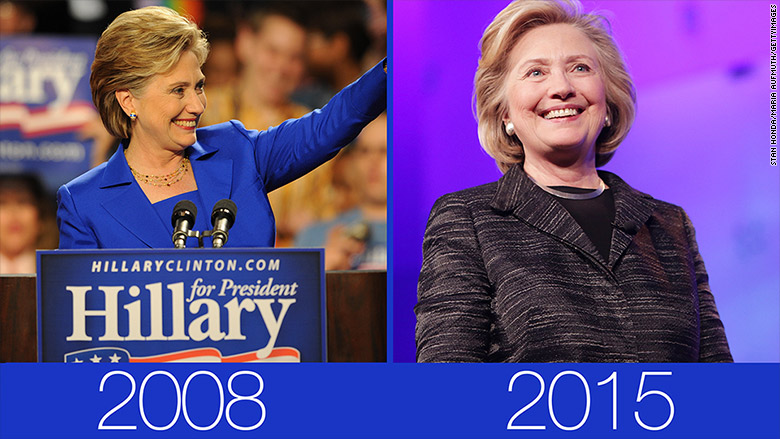
Clinton is expected to begin her presidential campaign this weekend, yet she's stayed mum on the economy -- something she hammered on during the 2008 campaign.
"She's a blank check at this point," says Dean Baker, co-director for the Center for Economic and Policy Research. "She'll be pressed to take positions."
America's economy has come a long way from 2008. Back then, the country was headed toward a recession. The unemployment rate was climbing -- eventually on its way to 10% -- while America's housing market was collapsing. The divide between Wall Street and Main Street was just beginning to widen, some argue.
Now, unemployment is down to 5.5% -- not far from its target level. Last year was America's best year of job growth since 1999. However, some big issues remain. Inequality is worsening and most people's wages have barely grown.
How Hillary approaches inequality, as well as her relationships with Wall Street and Main Street, will be key to her success in this campaign.
Here's how Hillary may shift her approach for 2016:
Related: 'Hillary' websites going for up to $295k
1. How will she tackle Inequality?
Then: Clinton heavily criticized President George W. Bush for his handling of the economy in 2008. She zeroed in on jobs losses, rising inequality and no wage growth.
While the economy hadn't fallen off a cliff yet -- unemployment was 5.6% when she lost the primary race -- her inequality rhetoric resonated with many Americans.
A Republican president ineligible for another election presented an easy punching bag for Clinton on inequality.
"President Bush had one final chance tonight to acknowledge what the American people have known for years: that the economy is not working for middle class families," Clinton said of Bush's State of the Union address in January 2008.
Now: Those problems haven't changed much under President Obama, but Clinton is unlikely to throw the same darts at her former boss.
Inequality is arguably worse now, and wage growth remains the economy's sore spot. In 2008, median weekly wages were $796 -- the exact same amount at the end of 2014, adjusted for inflation, according to the Labor Department.
Clinton must carefully calculate an inequality message without distancing herself from Obama's economic achievements, experts say.
"It s a very different world" from 2008, says Gary Burtless, an economist at the Brookings Institution. "There's more anger out there about the economy and inequality. She'll modify the rhetoric she uses."
Related: The tough task of going through Hillary's emails
2. Too cozy with Wall Street?
Then: The stock market boomed during Bill Clinton's time in office. Hillary liked to remind Wall Street of that in 2008. The tech boom, free trade agreements and bull market were all hallmarks of President Clinton's economy.
Bill had cemented a relationship with Wall Street that Hillary benefited from in 2008, says Larry Sabato, a politics professor at the University of Virginia.
"She was the candidate of Wall Street" in 2008, says Sabato.
Now: Wall Street is still expected to doll out millions to Hillary's campaign, but she must tip-toe more carefully around that support, experts say. The recession generated a scathing image of the bankers who helped finance Hillary's run in '08.
Most recently, democratic senator Elizabeth Warren is hammering big banks for more reforms and could press Hillary and others to take stance as well.
Hillary will have to find the balance between appealing to the Warren democrats that want greater financial change and Clinton's loyal Wall Street donor base, experts say.
"She'll want the populist rhetoric but also the money," says Sabato. With the Clintons, "the money comes first and it may be completely separate from the rhetoric."
Related: He serves BBQ to Bill & Hillary Clinton
3. Can she connect with Main Street?
Then: Clinton ridiculed President Bush in 2008, telling USA Today that the "moneyed class" had reaped all the benefits of his economy.
As a New York senator -- and former First Lady -- she championed middle class jobs, minimum wage laws and pushed for health care reform.
Several years later, Clinton's relationship with the moneyed class is much more public and perhaps political dynamite for her economic policies during this campaign.
Now: Average Americans are still struggling. Inequality is a much bigger issue than it was eight years ago, propelling Thomas Piketty's 700-page book "Capital in the 21st Century" to bestseller status last year.
Experts say Clinton's problem will be connecting with typical Americans. Since leaving the State Department, Hillary has made a fortune on speeches and her book, on top of Bill's well-known wealth.
Knowing this perception, Clinton plans to hold small campaign events this week geared at giving face time to average folks. How Clinton tries to relate to Americans on hot topics like inequality, middle class jobs and the federal minimum wage could be key early on.
Clinton has already tried once to convince Americans she had it hard. One political slip-up came when she wrote in her book, "Hard Choices" that she and Bill were "dead broke" when they left the White House in 2001. The comment was widely viewed as out-of-touch with Main Street realities.
"It was just bizarre," says Baker. The Clinton's wealth "is not anyone's idea of flat broke."
Related: 'President' Hillary Clinton: Good for stocks?
CNNMoney (New York) April 11, 2015: 9:05 AM ET
Anda sedang membaca artikel tentang
Hillary Clinton's economic plans need an overhaul
Dengan url
http://ngopingeteh.blogspot.com/2015/04/hillary-clintons-economic-plans-need.html
Anda boleh menyebar luaskannya atau mengcopy paste-nya
Hillary Clinton's economic plans need an overhaul
namun jangan lupa untuk meletakkan link
Hillary Clinton's economic plans need an overhaul
sebagai sumbernya
0 komentar:
Posting Komentar